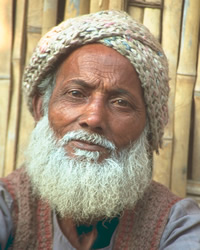South Asian, Bengali-speaking in United Kingdom

Photo Source:
COMIBAM / Sepal
|
Send Joshua Project a map of this people group.
|
| People Name: | South Asian, Bengali-speaking |
| Country: | United Kingdom |
| 10/40 Window: | No |
| Population: | 361,000 |
| World Population: | 5,981,400 |
| Primary Language: | Bengali |
| Primary Religion: | Islam |
| Christian Adherents: | 1.00 % |
| Evangelicals: | 0.13 % |
| Scripture: | Complete Bible |
| Ministry Resources: | Yes |
| Jesus Film: | Yes |
| Audio Recordings: | Yes |
| People Cluster: | South Asia Muslim - other |
| Affinity Bloc: | South Asian Peoples |
| Progress Level: |
|
Introduction / History
The United Kingdom, which consists of England, Wales, Scotland and Northern Ireland contains a variety of South Asian peoples who have come from former British colonies.
Among these newcomers to the UK are Bengali speakers. They include Hindus and Muslims since Bengalis can be either. Muslim Bengalis are usually from Bangladesh, though they can also be from India. Some came to the UK to escape the harsh lifestyles or political violence, while others have come in search of better educational or economic opportunities.
A small number of Bengalis migrated to the UK as early as the 1950s. They had no women, so this generation of migrants usually married British women. The 1970s was a key decade for migration from Bangladesh to the UK. 1971 was the year of the Bangladesh Liberation War. Some Bangladeshis stayed and fought against the Pakistanis, while others migrated to the UK and other safe locations. For the first time, they could have potential wives come. There were some restrictions on the number of Bangladeshis could settle there.
Most Bengalis did not speak English, so they were not able to get high-paying jobs. Instead, most were mechanics and cooks. There were racist attacks against Bengalis that decade, one of which led to a death. In the early 1990s, there were more racially motivated attacks.
Since that time, Bengalis have been integrating into the greater society and attacks have become rare.
What Are Their Lives Like?
Bengalis in the UK hold a variety of occupations, primarily in the cities. Some have wage-paying jobs in factories or work in port cities. Others have become small business owners. Bengali and Sylhetti Bengali have successfully begun a number of coffee shops in the urban UK. Bengali families are famous for their fine Indian restaurants. About 80 percent of the Indian restaurants in the UK are owned by Bangladeshis.
Bengalis are becoming integrated into the general UK society, especially those who are from the third generation. Bengalis have been elected officials at both the local and national level. That includes being elected to Parliament. Bengalis have a strong academic and artistic history. They have excelled in both in the UK. There are many Bengali academics; literature is their specialty. An increasing number of Bengalis are attending universities. They have affected the UK's sports, media, music, visual arts and film industry.
What Are Their Beliefs?
They have taken on western dress, speak the English language, and strive for the western level of success. One thing they retain is the Sunni Muslim religion. There are a couple of Bengali Muslim scholars in the UK.
Most of the Bengalis in the UK are Muslim. Islamic religious organizations have opened up in many of the cities, permitting them to join their fellow Muslims in clubs and leagues. The opening of a Muslim University in the UK increased the number of devout Muslims.
What Are Their Needs?
Most Bengalis in the UK are financially stable. Not many are still dealing with traumas from the 1971 war with Pakistan. However, they have spiritual needs that are unfulfilled. Without Christ, they cannot have a fulfilling spiritual life.
Prayer Points
Ask God to raise up loving Christians in the UK who will not be afraid to share the gospel with Bengali Muslims.
Pray that these peoples will begin to look for true acceptance and inner peace through Jesus Christ.
Pray for effectiveness of the JESUS Film and Christian television and radio programs in the Bengali language.